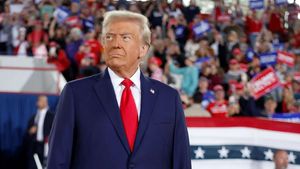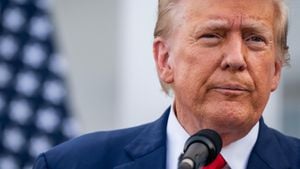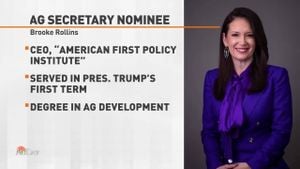The United States is reaffirming its dominant position as the world leader in artificial intelligence (AI) development, according to freshly released data from the Stanford University index. This authoritative index, produced by the Stanford Institute for Human-Centered AI, presents the AI capabilities of 36 nations through its Global AI Vibrancy Tool, making it clear how the global AI competition is shaking out. The United States, fueled by massive investments and innovative companies, leads the pack, with China and the United Kingdom following closely behind.
Last year, the U.S. poured approximately $67.2 billion, dwarfed only by China’s considerably lower investment of $7.8 billion. This stark difference highlights not only the sheer cash flow but also the depth of commitment the U.S. has toward advancing its AI capabilities. Companies like Google, Meta, OpenAI, and Anthropic showcase the U.S.’s stronghold on private sector innovations and responsible research. Congress is also getting involved, laying down foundational laws, albeit comprehensive regulations are yet to be established.
Meanwhile, China remains competitive, showcasing its prowess through patenting activity, especially around generative AI technologies. The Asian giant leads globally with the highest number of AI-related patents, which reflects its aggressive push to innovate and dominate the AI market. The Stanford report particularly notes how Chinese universities have also significantly contributed to the AI discourse through research publications. Major Chinese tech firms like Baidu, which has unveiled its chatbot Ernie, are fueling this progress.
The U.K. holds the third position, benefiting from its prestigious educational institutions churning out AI talent. The country is known for having hosted the inaugural international AI safety summit last year, which emphasizes its proactive approach to global AI governance. Within the U.K., Google's AI subsidiary DeepMind is recognized globally for its groundbreaking contributions, including recent Nobel Prize acknowledgments for its co-founders.
According to the Stanford findings, India ranks fourth, propelled by its rapidly growing AI research community and increasing economic investments. The public cannot be overlooked either, with AI themes gaining traction across social media platforms, highlighting the nation's eagerness to engage with these innovations.
The United Arab Emirates makes the top five list, marking its emergence as a growing AI hub through targeted initiatives and investments. For example, Microsoft’s $1.5 billion commitment to U.A.E.-based G42 indicates the nation’s ambitions to become key players in AI. Not far behind, France has also received accolades, holding sixth place thanks to its solid AI policies and innovative startups like Mistral.
South Korea, Germany, Japan, and Singapore complete the top ten rankings, reflecting their significant investment and strategic developments toward enhancing their AI sectors. The recent advent of the European Union’s ambitious AI Act signals concerted efforts among European nations to not just boost AI capabilities but do so responsibly.
To bolster such frameworks, the Global AI Vibrancy Tool was revamped, now utilizing 42 specific indicators to help evaluate the nuanced standings of nations’ AI ecosystems. This interactive tool allows stakeholders from various sectors, including government officials, researchers, and business leaders, to tailor insights to their individual needs, significantly enhancing the quality of AI-related decision-making.
The dynamics surrounding global AI developments continue to evolve, primarily driven by national interests. Countries worldwide are increasingly prioritizing AI innovations to bolster their global standings. This shifting tide also reflects the need for cohesive regulations, particularly as nations assess their competitive positions within the thriving AI marketplace. There is anticipation surrounding the U.S. administration’s National Security Memorandum focused on AI. Released following collaborative international discussions on the military uses of AI technology, the framework establishes guidelines meant to assert leadership and oversight over these advancements.
Key recommendations from the U.S. memorandum call for responsible development and use of AI, consistent with human rights and democratic values. The focus on enhancing national security through AI demonstrates how program development is entwined with international governance efforts. Countries across the globe are urged to cooperate for responsible governance frameworks to reap the benefits of AI technology without infringing on individual rights.
Looking at the broader picture, the international AI discourse is increasingly recognized as part of national security strategies, reflecting growing concerns over cybersecurity and misinformation - especially within the Indo-Pacific region. The rapid evolution of AI is pushing governments to adapt their approaches and develop dynamic strategies to combat misinformation, employing multinational cooperation to address challenges posed by advanced AI technologies.
While the U.S. is making strides to secure its lead, the growing capacities seen from China, the U.K., and other key players indicate strong competition. Emerging nations like Uruguay are also making significant moves with their national AI strategies, aiming to create digital infrastructure plans as they work to establish comprehensive governance frameworks. These trends herald the dawn of heightened global competition, where nations are not just developing AI for economic growth and efficiency, but doing so within frameworks meant to safeguard societal values.
With AI at the forefront of technological progress, the evaluations from the Stanford Global AI Vibrancy Tool resonate prominently, highlighting the need for nations to strategize effectively as AI continues to shape industries and economies on both regional and global levels.



